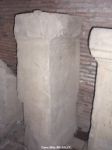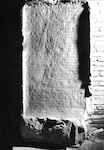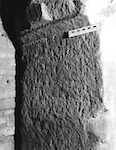
 
 
 
 
|
DiscussionBase for posthumous statue of Nicomachus Flavianus, praetorian prefect; commanded by the emperors. Rome, Forum of Trajan. 431. INSCRIPTION
In 38 lines:
Nicomacho Flaviano, cons(ulari) Sicil(iae), vicar(io) Afric(ae), quaest(ori) aulae / divi Theodosi, praef(ecto) praet(orio) Ital(iae) Illyr(ici) et Afric(ae) iterum, / virtutis auctoritatisq(ue) senatoriae et iudiciariae ergo / reddita in honorem filii Nicomachi Flaviani, cons(ularis) Camp(aniae), / (5) procons(ulis) Asiae, praef(ecti) urbi saepius, nunc praef(ecti) praet(orio) / Italiae Illyrici et Africae. / Imperatores Caess(ares) Fl(avius) Theodosius et Fl(avius) Placidus Valentinianus / semper Augg(usti) senatui suo salutem. / Clarorum adq(ue) inlustrium in ṛe ̣p̣(ublica) virorum adversum casus condicionis / (10) humanae interpolatum aliquatenus adserere honorem et memoriam / defuncti in lucem ạet[ern]a[m (?)] revocare emendatio quaedam eius sortis / videtur, quae praeiudịc̣[iu]m [sum]mumq(ue) [supple]mentum virtutum exsistimatur. /
Bono nobiscum, p(atres) c(onscripti), [faustoq(ue)] omin{i}<e> ịṇṭẹḷḷigitis profecto quidquid in resti/tutionem p̣r[.]ṇ[..]inis inlustris et sanctissimae aput omnes recor/dationis Flaviani senio[ri]s adimus, divi avi nostri venerationem esse, / (16) si eum quem vivere nobis servariq(ue) vobis – quae verba aput vos fuisse / pleriq(ue) meministis – optavit, sic in monumenta virtutum suarum titulosq(ue) revo/cemus ut quidquid in istum caeca insimulatione commissum est, procul ab eius / principis voto fuisse iudicetis; cuius in eum effusa benivolentia et usq(ue) ad an/nalium quos consecrari sibi a quaestore et praefecto suo voluit, provecta / (21) excitavit livorem inproborum. Nunc si aput vos abunde causas pietatis / adstruximus, accipite aliud: quod de vestris in illum sensib(us) et provinciar(um) / omnium iudiciis muniamur, quib(us) per illum locupletioris adhuc rei p(ublicae) / (24) bona vel adservata vel etiam aucta tantum et aput nos reverentiae contule/runt ut quod hodie facimus in pectorib(us) et sensib(us) vestris absq(ue) interpella/tione ulla mediae oblivionis fuisse noverimus. Ex quo quidem ipso non min[us] / memoriae illius quam nobis, p(atres) c(onscripti), supra omnia praestitis, ut non inmerit[o] / patientiae vestrae gratias agamus, ne quid erga restitutionem honoris eius / admoniti potius quam sponte fecisse videamur. Cum alioqui ipse etiam de institu/tione illius probatus saepe nobis parentibusq(ue) nostris Flaviani filiụ[s] / (31) honor semiplenus etiam sub praefecturae praetorianae apice, quem providẹ[ntia] / et industria sua cottidie auget, delatus exsistimetur nisi integer tandem et abs[olutus] / [r]eligiosi muneris debito totius domus eius familiaeq(ue) sit. Gaudete ergo nob[iscum] / p(atres) c(onscripti), optimo imperii nostri opere, ut nobiscum recognoscitis et redditam vobis e[t] / (35) patriae senatoris eius memoriam et dignitatem probate, cuius consortị[o] / clariores fuistis et in posteris eius eadem aput nos reverentia vigetis. / Appius Nicomachus Dexter, v(ir) c(larissimus), ex praef(ecto) urb(i), avo optim[o] / statuendam curavi.
[On the left side of the base:] Dedicata id[ibus] Sept(em)b(ribus)/ [Bas]so et Antiocho, vv(iris) cc(larissimis) conss(ulibus).
'Restored (reddita) to Nicomachus Flavianus, governor (consularis) of Sicily, deputy praetorian prefect (vicarius) of Africa, quaestor of the court of the late and deified (divi) emperor Theodosius, twice praetorian prefect of Italy, Illyricum and Africa, on account of his virtue and authority as a senator and a judge; also in honour of his son Nicomachus Flavianus, governor (consularis) of Campania, proconsul of Asia, several times prefect of the city and now praetorian prefect of Italy, Illyricum and Africa.
(line 7) The Emperors and Caesars Flavius Theodosius and Flavius Placidus Valentinianus, forever Augusti, to their own Senate, greetings:
(9) To assert the honour of men Distinguished and Illustrious in public life (clarorum adque inlustrium in re publica) which has been tarnished in some degree (aliquatenus) by a misfortune of the human condition, and to recall into light eternal the memory of the dead, does seem to be some mitigation of their lot, and is considered to be the prime evaluation and highest fulfilment of their virtues.
(13) The omen being good and favourable, you surely share Our understanding, Conscript Fathers, that whatever We undertake for the restoration of the reputation of the elder Flavianus, a reputation illustrious and most respected by all, is done out of veneration for Our deified grandfather; that is, if We should recall by means of monuments and inscriptions to his virtues a man whom Our grandfather wished to live for Us and to be preserved for you - and many of you remember these words being spoken in your presence - in such a way that you should conclude that whatever wrong was done him by blind slander was far from being the Emperor’s own wish. (19) For it was the Emperor’s abounding goodwill towards him, which extended as far as the Annals which he willed should be dedicated to Himself by one who was quaestor and prefect, that provoked the envy of wicked men. Now that We have established with you these ample explanations of Our dutiful conduct, let Us further add that We are fortified by your feelings towards him and by the judgement of all the provinces, a judgement to which the good things preserved or even increased, of a commonwealth (rei publicae) which he made richer still, have contributed so much reverence in Us also that We know that what We do today in your hearts and feelings has been done without any intervening moment of oblivion.
(26) For this very reason indeed, Conscript Fathers, you cherish his overarching memory no less than We do, so that We rightly give thanks to your forbearance in not allowing Us to give any appearance of being prompted to restore his memory, which We do of Our own accord.
(29) Whereas also the son of Flavianus, whose paternal upbringing has often commended him to Us and Our fathers, might be thought to have been only half-honoured even by the crowning office of praetorian prefect which he increases daily by his foresight and industry, were he not to be made whole at last and freed of the binding duty he owes to his whole house and family.
(33) Rejoice then with Us, Conscript Fathers, in this excellent action of Our reign, that you may join with Us in recognizing that the memory of this senator has been restored to you and his country, and give your approval to an honour, by sharing which you have become more Distinguished (clariores) and flourish with the same reverence as We do towards his posterity.
(37) I, Appius Nicomachus Dexter, man of Most Distinguished rank, sometime prefect of the City, saw to the erection of this statue to my excellent grandfather.
[On the left side of the base] Dedicated on the Ides of September in the consulship of Bassus and Antiochus, both of clarissimus rank. [13 September 431]'
(Translation by Roger Tomlin)
Letter height: 1.5 - 2 cm. Small and densely set.
Roger Tomlin has also provided the following notes to his translation:
The translation is as faithful as possible to the verbosity and incoherence (notably in the absence sometimes of main verbs) of the original, though a subject has occasionally been supplied where the Latin, with its wider range of pronouns than English, is content with a pronoun. Pronouns relating to emperors have been capitalised, as have words that allude to formal titles of rank (e.g. the 'clarissimus' and 'inlustris' of senators).
The object of reddita, ‘restored’, at the start of the inscription, is not specified, but is presumably the statue itself. Latin reddita is wider in sense than simply ‘granted’, but also does not over-emphasise that Flavianus had been honoured by a statue before his fall, and was now getting it back.
Divus in lines 2 and 15, referring to Theodosius I (379-93), is here rendered as ‘deified’, its traditional meaning, though some might prefer ‘blessed’ when referring, as here, to such a pious Christian emperor as Theodosius.
Aliquatenus in line 9, ‘in some degree’, is here associated with interpolatum, ‘tarnished’, the word that precedes it, rather than with adserere, ‘assert’, the word that follows it, although the word-order slightly favours the latter association. Rather than an expression of modesty by the emperor, the overall sense of the inscription suggests that it is a claim that Flavianus was only ‘in some degree’ tarnished.
The religiosum munus, ‘binding duty’, of line 33, that the younger Flavianus owed his family, and from which he has now been released, is the quasi-religious obligation to rehabilitate his father’s memory.
This is an important inscription, combining two different types of text: the dedication of a statue (lines 1-6 and 37-38) and an imperial letter to the Senate. The language of the inscription is interesting in itself, alluding to the activities of Flavianus and his family in the edition of texts in late antique Rome (Hedrick 2000, 173-177).The inscription is no longer easily legible, and parts of it are badly corroded.
DESCRIPTION
Tall marble base, in two pieces, of which we were only able to trace the front (with the inscription): 54 x 94 x 42 cm. The base has deep mouldings at top and bottom, both damaged. The epigraphic field measures 97 x 68 cm. It has a narrow frame, is deep, and the inscription is carved very near the cornice, where the difference in level suggests that the base is a piece re-used after the erasure of an earlier inscription. The right side is currently placed against a wall and cannot be seen. The left side bears the consular date. The top has one hole sunk into it.
PROVENANCE AND LOCATION
The front of the base was discovered in 1849 in the Forum of Trajan (the back was discovered in the same area in 1933). It is now in the deposit of the basilica Ulpia (FT 14451 - main fragment).
HONORAND
The statue was dedicated to Virius Nicomachus Flavianus in 431, 37 years after his death. Flavianus occupied important positions in the reign of Theodosius I, and was an influential senator in Rome. In 392 he joined the usurpation of Flavius Eugenius in the West, and was appointed consul in 394 (PLRE I, 347-349 Flavianus 15). He took the opportunity to promote the association of the regime with pagan cults, and when the troops of Eugenius were defeated in 394 he committed suicide (Matthews 1975, 238-247). His son Nicomachus Flavianus had also joined the usurpation, and was forced to withdraw from public life until 399, when he was appointed urban prefect, going on to occupy important roles in the regimes of Honorius and later Valentinian III (PLRE I, 345-347, Flavianus 14; Chastagnol 1962, 239-244). The text of the dedication emphasizes the fact that the statue of Flavianus was an honour to the son as well as the father, and is a good example of how an individual honour could be seen as benefitting an entire family.
AWARDER
The statue was dedicated by the emperors Theodosius II and Valentinian III, as part of a process of rehabilitation of the memory of Flavianus. The letter addressed to the Senate (lines 7-36) invites the members of the Curia to take part in the reversal of Flavianus' condemnation in the aftermath of 394, and makes reference (in line 17) to the monuments and inscriptions that attested to his virtue (amongst which statues were probably included). However, the letter does not mention the involvement of senators in the setting up of this statue, unlike other dedications in the Forum of Trajan, which are described as carried out by the emperor at the request of the Senate.
The dedication was carried out by Appius Nicomachus Dexter, grandson of Flavianus the elder, and the inscription explicitly refers to this relationship ('avo optimo, to my excellent grandfather'). Dexter was probably the nephew of Flavianus the younger (PLRE II, 357-358 Dexter 3). He had held the urban prefecture at an earlier date; however the fact that the inscription describes him only as 'former prefect of the city' suggests that he undertook the present task as a private citizen, perhaps as a special honour.
DATE
The dedication is precisely dated by the consular date on the left side of the base, 13 September 431.
FURTHER DISCUSSION
The dedication is made to both Nicomachus Flavianus and his son Flavianus, which makes it a very unusual text. It is furthermore a good example of the intricacies of late Roman politics and the role played by statues in that society. Flavianus the elder had suffered a process of damnatio memoriae in the aftermath of the victory of Theodosius I and his own suicide. His son Flavianus also had to withdraw from public life for a few years, but again occupied important positions from 399 onwards. The dedication of the statue is seen as a restoration of the memory of the elder Flavianus, and at the same time an honour to his son, the praetorian prefect of the day.
The imperial letter to the Senate is a sophisticated document, presenting the damnatio of the elder Flavianus in 394 as contrary to the wishes of Theodosius I, and inviting the Senate to view it in the same light. In order to rehabilitate Flavianus, it was necessary to rewrite the history of the past, presenting him as one of the favoured sons of the Theodosian dynasty, and not as its rebellious enemy.
[4/12/2021: We are very grateful to Silvia Orlandi for sending, and allowing us to upload the two attached images of the base from the Silvio Panciera Photo Archive.] Carlos Machado
Main Reference
Corpus Inscriptionum Latinarum; , VI, no 1783 (+p. 4760-1)
Hedrick, C. , History and silence: purge and rehabilitation of memory in late antiquity, Austin 2000,
Discussion References
Chastagnol, A., Les fastes de la Préfecture de Rome au Bas-Empire, Paris 1962,
Jones, A. H. M. et al., The Prosopography of the Later Roman Empire. Vol. I 260-395, Cambridge et al. 1971 (1975), pp. 345-347 (Flavianus 14) and 347-349 (Flavianus 15)
Martindale, J. R., The Prosopography of the Later Roman Empire. Vol. II A.D. 395-527, Cambridge 1980, pp. 357-358 (Dexter 3)
Matthews, J., Western Aristocracies and Imperial Court, AD 364-425, Oxford 1975,
|

